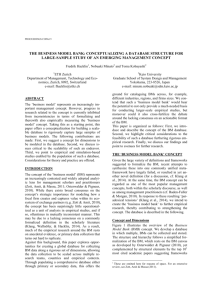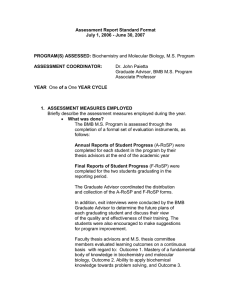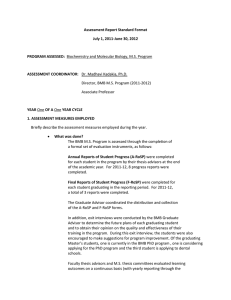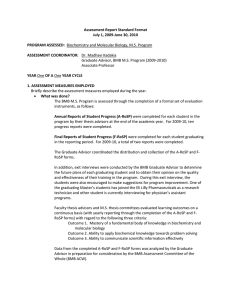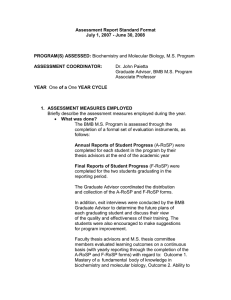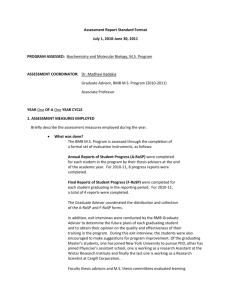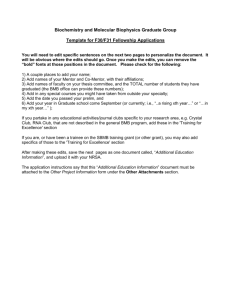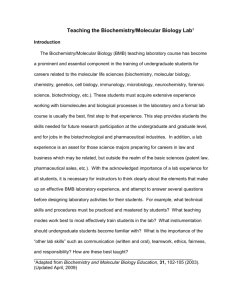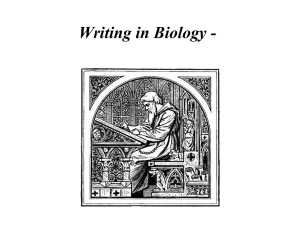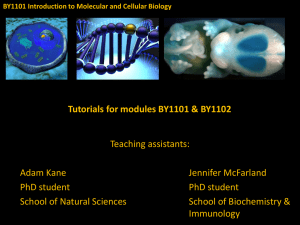Biochemistry Working Core Concepts
advertisement
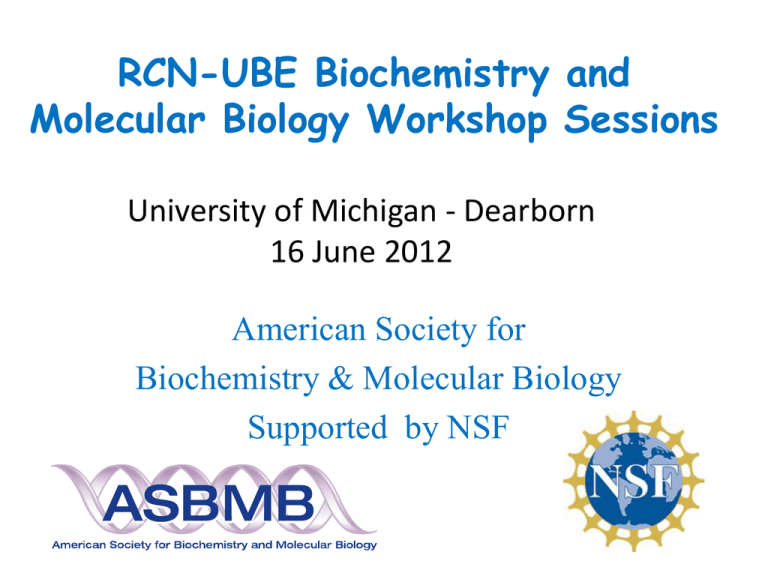
RCN-UBE Biochemistry and Molecular Biology Workshop Sessions University of Michigan - Dearborn 16 June 2012 American Society for Biochemistry & Molecular Biology Supported by NSF Goals of This Today’s Workshop 1. Rewrite BMB Core Concepts into sentences 2. Transform BMB Core Concepts into ≥ 5 Specific Performance Expectations. 3. Identify underlying concepts from chemistry, physics, biology and math that support one Performance Expectaions. Promoting Concept Driven Teaching Strategies in BMB through Concept Assessments Biochemistry Working Core Concepts From workshops across the nation, and from small working groups last year, three (3) core concepts and a set of skills have emerged. These core concepts and skills will occupy us in various ways for the rest of the day. First we need to create working groups of about four people each. You will stay with this group for the workshop activities. Promoting Concept Driven Teaching Strategies in BMB through Concept Assessments Problem-Solving Ability in Groups Impossible Problem Difficulty Can’t Solve Trivial Might Solve PBL Solution obvious A B C D Group Members Group Potential Problem solving is what you do when you don’t know what to do, otherwise it is not a problem. Wheatley (1984) Forming Groups Homogeneous vs. Heterogeneous “Homogeneous” Groups Your Class “Heterogeneous” Groups What Aspects of Heterogeneity are Important for this Workshop? If you know you want to form heterogeneous groups, but don’t know critical information about your audience, what can you do? Let the sthem help you. Forming Heterogeneous Groups Without Prior Information • If you are Male, add 400 400 • If you are Female, add 200 • If you consider yourself a Molecular Biologist – add 200 • If you consider yourself a Biochemist – add 100 100 • If you are employed by a PUI – add 100 • If you are employed by a University – add 50 50 •_______________________________________________________ Sum the last 2 digits of your Phone Number 8 • GRAND TOTAL (Your Number) 558 When you have calculated “Your Number”, line up in numerical order. Four Working Core Concepts 1. Energy: Fundamental Nature, Utilization and Flow (Groups 1 & 5) 2. Core Concepts in Biochemistry and Molecular Biology are Based on Certain Skills: (Groups 2 & 6) a. Objective Measurement b. Quantitative Analysis c. Critical Interpretation 3. Macromolecular Structure, Function, Regulation, and Storage (Groups 3 & 7) 4. Transformation and Transfer of Information (Groups 4 & 8) Promoting Concept Driven Teaching Strategies in BMB through Concept Assessments Session I: Input and Feedback from Biochemistry Educators on Working Core Concepts Each group transform your assigned core concept into a complete sentence (or two) that would succinctly capture its meaning . Elect a group recorder who has the responsibility of capturing your group’s responses and communicating them to me. Promoting Concept Driven Teaching Strategies in BMB through Concept Assessments Session II: Unpackaging Core Concepts Working in your groups, write at least five performance outcomes for your assigned core concept. These would be the ≥5 most important learning objectives for this core concept or skill set. These performance outcomes should embrace the breadth of that core concept. Use Bloom’s Taxonomy (in binder) to choose appropriate verbs for the cognitive levels of the objectives. Promoting Concept Driven Teaching Strategies in BMB through Concept Assessments http://metamediausa.com/web/wp-content/uploads/2010/06/BloomsTaxonomySized.jpg Bloom’s Taxonomy http://www.proprofs.com/flashcards/story.php?title=blooms-taxonomy-thinking www.teach-nology.com Promoting Concept Driven Teaching Strategies in BMB through Concept Assessments Session III: Identify foundational concepts from Chemistry, Physics, Biology, and Math Working in your group, consider your core concept and relate it to foundational concepts from chemistry, physics, and math. Select the appropriate ones for the learning objectives that you developed. If there are additional foundational concepts, please identify them. i. e. What do students need to know and use from prerequisite courses to understand your core BMB concepts? Promoting Concept Driven Teaching Strategies in BMB through Concept Assessments What Do Our Students Need to Know? COO COO CH2 CH2 H3C O CH3 H3C N H C H N H C H H N H C H CH3 N H O Chemistry Biology Provides the methods and molecular perspective Provides the means to evaluate and predict Biochemistry Molecular Biology Mathematics Provides the relevance Provides physical models Physics Future Direction of the Project Change and refine wording of core concepts in biochemistry and molecular biology based on nation-wide workshops such as this one. Compile learning outcomes developed at these workshops for each core concept. Identify foundational concepts from chemistry, physics, biology, and math. Promoting Concept Driven Teaching Strategies in BMB through Concept Assessments Thank you Thank you for your time and effort in developing these national biochemistry and molecular biology core concepts and learning objectives! Brings Chemistry to Life Promoting Concept Driven Teaching Strategies in BMB through Concept Assessments
